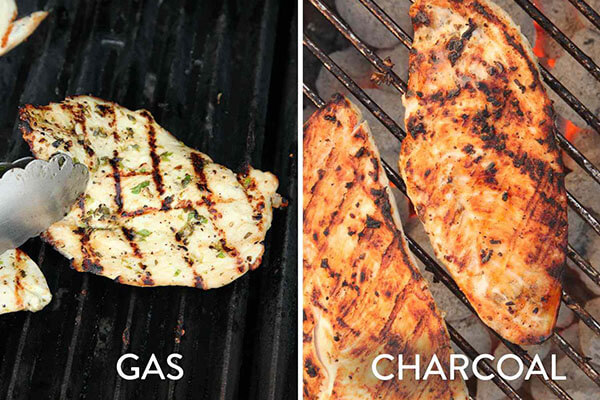In this article, you will learn about the
main differences between gas and charcoal grills, what
kind of food is best for each grill, and the general advantages and
disadvantages of each grill.
The gas grill has some nice benefits:
•
The gas grill is convenient and quick to use,
just turn the knob to ignite and change the temperature
•
You can find a gas grill that fits most
budgets
•
The high-end grill has enough functions, you
don’t need to step into the kitchen again.
Charcoal requires more technology to ignite the charcoal and maintain the required temperature.
•
once you know how to keep charcoal grills at
the right temperature, these grills are made for scorching heat and can easily
reach high temperatures
•
You need to do more to clean and maintain the
charcoal grill
•
In return, you can taste mouth-watering
authentic food every time, without expensive additional costs (such as infrared
burning)
How does a charcoal grill work?
You also have a ceramic Kamado-style grill, and in more rare cases, a large built-in or free-standing grill.
In all cases, the heat from burning coal will cook your food. The vent controls the airflow of the coal, and the coal controls the temperature.
Some charcoal grills have an adjustable charcoal tray that allows you to move the charcoal closer to or away from the cooking grill for more intense burns when needed.
For some people, igniting charcoal can be a difficult point. The good news is that you don’t have to soak it in a lighter liquid.
The easiest way to
ignite charcoal is to use a chimney starter, which you can pick up cheaply.
Advantages of charcoal grilling:
• There
is no doubt that charcoal grills can produce the best tasting food.
•
If you want to grill your food (if you make a
lot of steaks), a charcoal grill is the natural choice. Coal will naturally
reach a higher temperature than the gas alone (there is no infrared burning
zone, additional costs are required).
•
Many charcoal grills can be used as a smoker
with the right technical know-how.
In most cases, you will spend less on a charcoal grill than on a gas grill of the same quality. This is mainly due to their simple design and less complex parts.
In terms of operating costs, the cost of charcoal will be higher than that of natural gas. The exact difference will depend on where you live.
You must weigh how often you plan to grill to decide which option is the most cost-effective in the long run.
Although we like to
cook with charcoal, it is definitely not for everyone.
Why charcoal may not be right for you:
•
If you are really hungry, you will have to
wait longer to prepare meals when cooking with charcoal. You need to light the
coals, wait for them to turn to ashes, and then allow the grill to heat up
before you are ready to start.
•
When using charcoal, cleaning and maintenance
are more complicated. In essence, charcoal is dirtier, and you have to wait for
the coal to cool before you can start cleaning it.
•
Adjusting the temperature of a charcoal grill
requires more practice and expertise. Some people may see this as part of the
fun, rather than a “scam.” We will let you decide for yourself.
•
Some apartment buildings do not allow
residents to use charcoal grills.
What kind of food is charcoal best for?
If you burn it often, the charcoal will glow, and you prefer the deep smoky taste.
The taste of hamburger patty cooked with gas and charcoal is not much different.
However, when it comes to thicker pieces of meat such as steaks that require longer cooking times, the difference in taste becomes obvious.
If you are ready to
spend a little more time on cooking, do a lot of grilling, or even want to try
using the grill as a smoker, then charcoal is for you.
How do gas grills compare?
The most obvious difference between gas and charcoal is fuel.
The gas grill will use propane (lpg) or natural gas. Propane is the most common, which is why you hear the terms “gas” and “propane” grill. They both mean the same thing.
To use natural gas, you need to have a natural gas pipeline to the house, and then you need to connect a natural gas grill.
In unavailable areas, you will need to use refillable bottles of LPG. These bottles are usually placed behind or under the grill.
These grills are
slightly more complicated than charcoal. Let’s see how they work:
•
The gas flows from the bottle to the cooker
through the regulator through the hose.
•
It then flows through a manifold that runs
along the cooking zone.
•
The gas moves from the manifold through the
valve.
•
You can control the amount of burning gas by
turning the knob on the grill.
•
These controls regulate the amount of gas
allowed to pass through the valve, which in turn controls the temperature.
High-end gas grills
may have infrared burners that can amplify and evenly distribute the heat
generated by the gas flame.
Why gas grills are so popular
•
Gas is quick. The grill will be very hot and
can be ready in 10 or 15 minutes. For those who are short on time or need to
cook for the crowd, natural gas is definitely easier to use than charcoal.
•
The gas grill cools quickly and is easy to
clean.
•
Controlling the temperature on a gas grill is
as simple as adjusting the dial. If you plan to use the 2-zone cooking method,
you need to learn some knowledge, but once you try it, the gas will maintain a
steady heat and there are no quirks like charcoal to learn.
•
There are plenty of accessories for gas
grills, which means you can do anything with a high-quality gas grill. However,
you will pay for these features.
Although the gas grill is not perfect
•
If you plan to burn or smoke, cheap gas
grills will not be comparable to charcoal grills with comparable prices
•
You can pay some large cash on the gas grill
to include features such as an infrared burner to make it burn better.
•
If not handled properly, the gas may explode.
Although most gas cylinders and grills now have mechanisms to reduce the risk
of this happening, there are still some examples that indicate the possibility
of gas rising in a big explosion.
What is the best food for a gas grill?
If you buy a basic gas grill without all the bells and whistles, they will be best for grilling thinner pieces of meat, such as burger patties, chicken wings, and sausages. When cooking thin meat, the lack of smoke smell is not obvious at all.
If you can spend money on more expensive gas grills, then the sky is the limit. You can cook almost anything perfectly by adding cigarette cases, barbecue buns and burning zones.
Now you
know why both grills have avid fans.
But you
may still want to know:
“If I
can only choose one grill, gas or charcoal is best for me?”
Read on to
learn how these grills compare in 4 key categories.
Gas and charcoal grills go hand in hand
Easy to use
•
Gas – The grill starts fast, the temperature
is easy to control, and the cleaning work is easy.
•
Charcoal-it requires more labor intensive
cleaning and maintenance of the grill, and reaching and maintaining the
temperature requires some practice and some knowledge.
Temperature control and range
•
Gas-Controlling the temperature of a gas
grill is as simple as adjusting some dials. If you plan to use the 2-zone
method (which you should do), more work is required, but all that is needed is
a few dry runs with a good thermometer to experiment with your settings.
•
Gas-will drop in the temperature range.
Although high-end grills can reach high enough and low enough to smoke, cheaper
gas grills will not give you this flexibility.
•
Charcoal-Charcoal will reach the temperature
required for burning and can be kept low enough to smoke. You should be able to
use any charcoal grill you buy to do this, but you need to understand how to
maintain the temperature.
Fancy features
•
Gas-If you like “function”, then
you will find a lot on high-end gas grills. Burning zone, barbecue grill kit,
side burner, infrared burner, remote temperature monitoring system, gas level
indicator, backlight, cigarette case, the list is endless.
•
Charcoal: The reason many people are so keen
on charcoal grills is because they are “old school”. Therefore, even
on high-end charcoal grills, fancy functions will be limited. As the price
increases, the build quality will improve, and you might expect some features,
such as an adjustable charcoal tray and easy cleaning, but you won’t find as
many fancy features as a gas grill.
Environmental impact
•
Natural gas: Natural gas needs to be
extracted from the ground, and the method used does affect the environment. Like
any burning fuel, when you use gas to cook, smoke and gas are released into the
air, but overall, gas is a highly efficient fuel.
•
Charcoal: There are two ways of reasoning
about the source of charcoal. Although some people claim that this coal can be
made from sawmill leftovers that will be scrapped anyway, if you use
higher-quality lump charcoal, you may be concerned about the amount of wood cut
to make this coal.
Otherwise, some air
pollution issues need to be considered when burning charcoal. A study conducted
in 2012 found that the use of charcoal grills can increase air pollution to 2.6
times the normal level.
How is the barbecue and my health?
Some barbecue enthusiasts are not so worried about their health, thinking that they have not been here for long. But for those who are worried about staying around for a long time, there are some factors to consider.
Charcoal is a known carcinogen, and cooking with charcoal means that more charcoal will eventually enter your esophagus.
You need to worry about more than just the black crunchy crumbs on the surface of the food. Meat cooked at high temperatures will produce some problematic compounds.
As we have determined, charcoal grills are more capable of reaching those high temperatures, and controlling the temperature may be more difficult.
Although it is easier to control the temperature of a gas grill, if you have a good enough gas grill, you can still grill at a temperature that provides good charring (and may have a higher risk of cancer), so use a gas grill and The hook is not completely closed.
More research is needed on how much of these compounds we need to take before our health is severely compromised, so it may not be the time to panic.
At the same time, if you can’t give up using coal for grilling but are worried, you might be able to limit the number of times you eat coal-cooked meals per week, or consider using a combination of gas and charcoal for grilling.
This
may just be a good excuse to buy gas and charcoal grills.
Wrapping it up
As we did not hint so subtly throughout this article, there is no clear winner in this head-on confrontation. It really boils down to your priorities.
If you are looking
for a smoky flavor and are ready to invest more time and effort to achieve it,
then a charcoal grill may be your best choice. If you are going to give up some
smoky flavors for ease of use and speed, gasoline may be your best choice.

